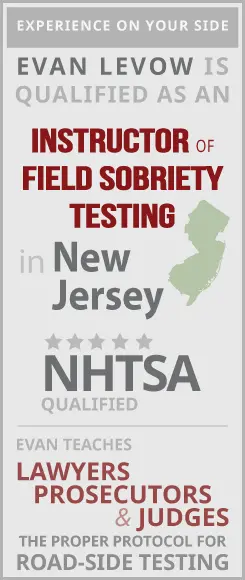If you are stopped by the police on suspicion of driving while intoxicated in New Jersey, you do not have to submit to field sobriety testing. It is not required by law and you cannot be ticketed for your refusal.
Roadside Testing In New Jersey: Your Rights
But police officers aren’t required to tell you that field exercises are voluntary either. And under current legislation, you do not have to be read your Miranda rights before you are asked to perform any roadside sobriety testing.
Since these tests will be used to try to convict you of DWI should you be arrested, it is imperative that you know your rights with regard to roadside sobriety exercises.
How Can New Jersey Use Field Sobriety Testing Against Me?
If you’re arrested, you can be convicted of DWI in two manners.
The first way is for you to have a blood or breath alcohol concentration of 0.08 percent or higher.
The second way is to prove that your ability to operate a motor vehicle was impaired by alcohol or drugs. In this instance, it is imperative that the roadside sobriety tests conducted were reliable and that they were conducted immediately prior to your being arrested.
While it is possible that breath or blood tests can be excluded as evidence at your trial due to errors during testing, the prosecution will still rely on the field sobriety tests when trying to prove that you were driving under the influence of alcohol or drugs. It’s their fallback evidence, and in order to build a solid defense, your attorney must be able to discredit the field tests, in addition to breath, blood, or urine screenings.
Can A DWI Attorney Challenge Field Sobriety Test Results?
A challenge against field sobriety testing can rely on a variety of aspects. For example, if you were able to get out of your car and approach the police officer’s chosen testing spot without using either the car door or the car itself for support, you already have a head start on being able to challenge the field sobriety tests in court.
If the officer did not ask if you had injuries such as those to the head, back, legs, knees, or feet that may cause problems with parts of the test – such as walking a narrow line or standing on one foot – the validity of the results could be compromised. Any problems, like middle-ear infections or vertigo, that could compromise your ability to balance could invalidate test results.
Finally, if you are 65 years or older or more than 50 pounds overweight, you should not have to submit to field testing. If you are still tested and these factors are not taken into account, they could be grounds for a successful challenge.
Also, consider the shoes you were wearing and the conditions of the test area. You should be given the chance to remove shoes with heels that are two inches or higher. You should also be asked to submit to field testing only in an area that is well-lit and flat. A dry and hard surface that is non-slippery is also required if the test results are expected to be accurate. Since these attributes do not accurately describe a lot of roadsides, which are usually sloped and covered in gravel for water run-off, many field sobriety tests can be challenged on these grounds.
Types Of Field Sobriety Test
There are a variety of activities that police use as field sobriety tests, although only three have been scientifically validated as accurate when administered correctly. Alternatives include counting complicated patterns on your fingers, extending your arms and then touching your nose, or reciting the alphabet.
None of these “tests” are proven to predict intoxication or blood-alcohol levels over the limit, because none have set rules beyond what you are told to do by the officer. While they may indicate whether you can follow directions accurately, they are not proven accurate as indicators of intoxication. In fact, some tests, such as being asked to hold your head back and keep your eyes closed, or bend at the waist while keeping your arms hanging in front of you, are designed to make you sway back and forth and therefore fail the supposed sobriety test.
Overall, there are three scientifically validated tests, studied and approved by the National Highway Traffic Safety Administration (NHTSA). If administered correctly, precisely as the police officers are taught to administer them, they are considered fairly reliable predictions of whether a Blood Alcohol Content (BAC) is higher than 0.08 percent.
One-Leg Stand (OLS)
The first validated test is the one-leg stand. If all instructions are given correctly and the officer demonstrates each instruction as it is given, the test is considered 65% reliable for predicting BAC over the legal limit.
Instructions must include standing with feet together and arms at your side and keeping that position until instructed to start. When told to begin, you should be both told and shown how to raise either leg about 6 inches and keep your foot pointed out. With both legs straight and arms at your sides, you will be asked to hold that position for no longer than 30 seconds. You must be told that you are to watch your raised foot at all times during the testing.
The officer must confirm that you understand the instructions before beginning the test. Scoring factors include any swaying or using arms to balance, putting your foot down, or hopping to keep your balance. Putting your foot down more than three times can be considered a “decision” point. The officer must tell you that if you stop during the testing, you may pick your foot up again, and start counting where you left off.
Walk-and-Turn (WAT)
Another standardized test is the walk-and-turn test. When administered correctly, this one is 68% reliable at predicting a blood alcohol content over the legal limit.
Again, the officer is expected to both tell and show you the correct way to perform this test and to confirm your understanding at intervals throughout the instructions. Correct instructions include having you place your left foot on a line first, then your right foot in front of your left with the right heel touching your left toes. Arms are again kept at your sides. You must be told to watch your feet at all times during the exercise.
After confirming your understanding of the instructions and telling you to begin, the officer will observe as you take nine heel-to-toe steps forward and nine back. Turning should consist of keeping the front foot on the line and using the other foot to take small steps in a semicircle. Arms should stay at your sides while walking and you will be expected to count the steps out loud. You are not supposed to stop until all steps are done.
Scoring criteria include whether you can maintain your balance while listening to the instructions, whether your steps are within one-half inch of being heel-to-toe, whether you need your arms for balance, can stay on the line and complete without stopping, and whether you started before the instructions were done, did not turn properly, or walked the incorrect number of steps.
Horizontal Gaze Nystagmus (HGN)
The third and final standardized test is called the horizontal gaze nystagmus, or HGN. This test has not been held to be admissible in New Jersey courts to prove that you were under the influence of alcohol.
In addition to these three tests, an officer could use any test he or she likes at the roadside. It is then your attorney’s job to challenge its validity.
Contact A DWI Defense Lawyer In New Jersey
The attorneys at Levow DWI Law, P.C. have undergone the same training that police officers receive in standardized field sobriety testing, from the same governmental organization, the National Highway Traffic Safety Administration. Evan Levow himself is qualified as a roadside exercise Instructor by the NHTSA, one of only five lawyers in the state to share that distinction. We know when mistakes have been made.
If you have any concerns about your field sobriety tests, contact the experts at Levow DWI Law, P.C. for a free consultation.


